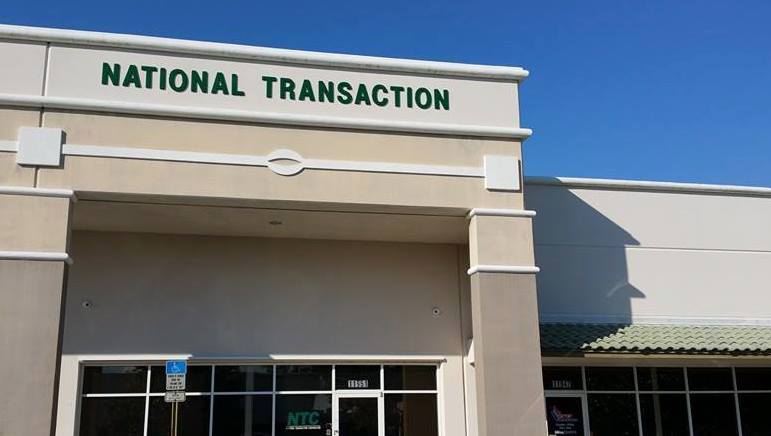
February 2nd, 2016 by Elma Jane
Businesses continue to struggle with the prohibited storage of unencrypted customer payment data. The Payment Card Industry Data Security Standard (PCI DSS), merchants are instructed that, Protection methods are critical components of cardholder data protection in PCI DSS Requirement.
PCI DSS applies to every company that stores, processes or transmits cardholder information. Regardless of the size or type of business you operate, the number of credit card transactions you process annually or the method you use to do so, you must be PCI compliant.
Data breach is not a limited, one-time occurrence. This is why PCI compliance is required across all systems used by merchants.
Encryption and Tokenization is a strong combination to protect cardholder at all points in the transaction lifecycle; in use, in transit and at rest.
National Transaction’s security solutions provide layers of protection, when used in combination with EMV and PCI-DSS compliance.
Encryption is ideally suited for any businesses that processes card transactions in a face to face or card present environment. From the moment a payment card is swiped or inserted at a terminal featuring a hardware-based, tamper resistant security module, encryption protects the card data from fraudsters as it travels across various systems and networks until it is decrypted at secure data center.
Tokenization can be used in card not present environments (travel merchants) such as e-commerce or mail order/telephone order (MOTO), or in conjunction with encryption in card present environments. Tokens can reside on your POS/PMS or within your e-commerce infrastructure at rest and can be used to make adjustments, add new charges, make reservations, perform recurring transactions, or perform other transactions in use. Tokenization protects card data when it’s in use and at rest. It converts or replaces cardholder data with a unique token ID to be used for subsequent transactions.
The sooner businesses implement encryption and tokenization the sooner stored unencrypted data will become a thing of the past.
Posted in Best Practices for Merchants, Travel Agency Agents Tagged with: card, card data, card present, cardholder, compliance, credit card, customer, data, data breach, data security, e-commerce, EMV, encryption, Mail Order/Telephone Order, merchants, moto, payment, Payment Card Industry, PCI-DSS, POS, secure data, Security, terminal, tokenization, tokens, travel, travel merchants

November 17th, 2015 by Elma Jane
Within the payment processing industry, Merchant accounts are categorized according to how they process their transactions.
There are two primary merchant account categories:
Swiped (Card Present) and Keyed (Card-Not-Present).
Swiped or Card-Present Transactions: Are those in which both the card and the cardholder are present at the time the payment is processed, they physically swipe their customers credit card through a terminal or point-of-sale system.
The sub-categories within this group include:
Retail Merchants – Normally conduct their business in an actual storefront or office space. They primarily use counter-top terminals or Point-of-Sale systems. Restaurant Merchants – Requires a special set-up that allows for tips to be added to the final sale amount by settling the transaction with an adjusted price that will include the tip amount.
Wireless / Mobile Merchants – They use wireless terminals or mobile phones to run these transactions in Real-Time. Have the ability to accept credit cards transactions wherever they are located out on the road.
Hotel / Lodging Merchant – Will authorize a customer’s credit card for a certain sale amount.
Card-Present Transactions also include grocery stores, department stores, movie theaters, etc. Card acceptance settings where cardholders use unattended point-of-sale (POS) terminals, such as gas stations, are also defined as card-present transactions.
Keyed-In or Card-Not-Present Transactions: Whenever the transaction is completed and the cardholder (or his or her credit card) is not physically present to hand to the seller.
The sub-categories within this group include:
Mail Order / Telephone Order (MOTO) – The customers card information is gathered via over the phone, fax, email or internet and then manually key-entered into a terminal or payment gateway software. Once the transaction is approved and completed, the product is then shipped to the customer for delivery.
eCommerce / Internet – Conduct ALL of their business over the internet through a web site. So all credit card transactions are processed online via a payment gateway in real-time. The payment gateway is integrated into the web sites shopping cart. The cardholders card is charged instantly.
Travel Merchants is one example of Keyed or Card-Not-Present Transactions.
Start processing credit card payments today whether Swiped or Keyed.
Give us a call now at 888-996-2273 so more details!
Posted in Best Practices for Merchants, e-commerce & m-commerce, Mail Order Telephone Order, Mobile Payments, Mobile Point of Sale, Point of Sale, Smartphone, Travel Agency Agents Tagged with: Card Not Present transactions, card present, card-not-present, card-present transactions, cardholder, credit card, credit card payments, credit card transaction, ecommerce, keyed, Lodging Merchant, mail order, merchant accounts, merchants, mobile merchants, moto, payment gateway, payment processing, point of sale, POS terminals, Restaurant Merchants, Retail Merchants, shopping cart, swiped, telephone order, terminal, transactions, travel merchants

November 16th, 2015 by Elma Jane
Travel Ban, Alert and Warning what’s the Difference?
Deciphering the difference between Travel Alerts and Travel Warnings can be confusing.
Travel Alerts – U.S. Department of State’s international travel alerts are issued around short-term events. Alerts are generally short-lived, and the government doesn’t hesitate to pull the alert once the potential concern has passed.
Travel Warnings – Federal Aviation Administration (FAA’s) travel bans on the other hand are the government’s gentle way of suggesting that you reconsider your trip entirely. Unstable government, civil war, ongoing intense crime or violence, and frequent terrorist attacks are all listed as potential reasons for a warning. Unlike alerts, warnings may stay in place for many years at a time if the climate of potential danger persists.
No matter where you are headed, remember that your safety must be your own priority. Americans traveling abroad should educate themselves on areas of the world to be avoided.
Posted in Best Practices for Merchants, Travel Agency Agents Tagged with: travel, travel agency, travel agent, travel industry, travel merchants

October 30th, 2015 by Elma Jane
This is a question we encounter on a daily basis. Travel environments are unique in that your transactions are usually keyed, there is almost always a delayed delivery period, large ticket transactions are not uncommon since one cardholder may be paying for multiple tickets, they tend to be seasonal, with peak season months generating an unusual spike in their “average” monthly volume, and chargeback’s pose a potential threat by travelers who are unable to complete their trip. Combine even a few of these factors together and you have cause for a reserve, or even account termination.
Being a part of a MO/TO (Mail Order/Telephone Order) or Keyed environment carries an increased risk of potential fraud or unauthorized use of a credit card. Since the credit card and cardholder are not present at the time of the transaction, the merchant has a limited ability to ensure the card is not being misused or that the proper AVS (address Verification Service) information is provided. NTC stresses the use of Credit Card authorization forms in order to obtain the correct credit card number, expiration date, billing address, and signature of the cardholder.
Travel merchants tend to have periods of increased volume based on peak travel seasons, whereas most other industries tend to have the same average monthly volume every month. This can generate spikes in volume on the merchant account that can trigger security concerns with the processor. Helping the merchant to analyze their volume trends and reporting the trends to the underwriters helps eliminate the security concerns when these spikes occur.
Large transactions which exceed the average sale amount for the merchant account can also trigger security concerns. Merchants who do not inform their merchant processor of large transactions prior to charging the credit cards can trigger security concerns and cause funding delays and reserve holds. Educating and clearly communicating with the merchant how to handle large tickets, volume spikes, and group bookings, prevents reserves, funding delays and/or other merchant account issues.
Another concern from the underwriters is the delayed delivery time frame. Delayed Delivery refers to the amount of time between accepting a credit card payment (whether a deposit or full purchase) and the time the cardholder travels. The client’s credit card is billed and the travel agent is paid however, the trip the travel agent was paid for doesn’t generally take place for 2 to 3 months. This leaves a lot of time for things to change, and should the client not travel for some reason, the first thing they do if the travel agent does not issue a refund, is claim a chargeback. NTC offers quite a few tips that can help protect the travel agent from chargeback situations.
Most merchants do not realize that merchant processors carry a financial risk on merchant accounts, and normally fund merchants prior to receiving payment from the client’s bank. Essentially, a merchant account is an unsecured loan. The merchant runs a transaction and at the end of the day they settle their batch. Generally the merchant will receive the funds for that batch in their bank account within 2 business days even though the travel arrangements the client paid for do not take place right away.
Here at National Transaction Corp, we specialize in understanding what makes your transactions, as a travel agent, unique in how they affect your merchant account. Educating the merchant and ensuring they have a good understanding of what makes travel merchant account high risk, is one of our specialties. We have established a special relationship with our underwriting department which facilitates our ability to approve your high risk travel merchant account.
Contact your travel merchant account specialist at NTC today.
Mark Fravel
National Transaction Corp
Founder and President
888-996-2273
Posted in Best Practices for Merchants, Travel Agency Agents Tagged with: address verification service, avs, card holder, card payment, chargeback, credit card, Mail Order/Telephone Order, merchant, merchant account, merchant processor, moto, transactions, travel agent, Travel environments, travel merchants
July 28th, 2015 by Elma Jane

The annual ASTA Global Convention is set to take place in Washington, D.C., August 29 to September 2, 2015.
A conference that is designed for all travel merchants, whether they are home, office or storefront-based.
American Society Of Travel Agents (ASTA) plays such a vital role in government lobbying and regulation, travel agent awareness and education.
This year’s convention will feature a full roster of speakers, educational seminars, networking events and local sightseeing.
ASTA Global Convention will feature pre-convention events including the chance to see a Washington Nationals baseball game, special tours of Washington, D.C. and the annual ASTA Advocacy Dinner.
The convention will take place at the Omni Shoreham Hotel near Georgetown. Hotel rates start at $169, booking with the dedicated room block ends August 7.
ASTA registration rate will increase on August 1 by $25.
For more information or to register, click on ASTA Global Convention.
Posted in Best Practices for Merchants, Travel Agency Agents Tagged with: merchants, travel, travel merchants
January 6th, 2014 by Elma Jane
It can be difficult for travel agencies to choose a merchant services provider. The credit card processing industry generally categorizes travel agents as a high risk business type due to the fact that most travel agency transactions take place long before the actual product or service is delivered to the customer. This leaves travel merchants open to chargebacks and other payment disputes, which are costly procedures that deter many merchant services providers from offering travel merchant accounts.
National Transaction Corporation is one of the travel merchant account providers and credit card processors to provide high risk merchant services for travel agents. Most providers are geared toward e-commerce business types, although some offer options for traditional travel credit card processing. National Transaction Corporation (nationaltransaction.com) is a Coral Springs, FL-based, NTC’s member bank is US Bank Minneapolis, MN; that offers high risk travel agent merchant accounts. NTC’s credit card processing, no holds on funding, integration with Trams, Sabre, and ARC business solutions, and payment gateways for e-commerce travel merchants. National Transaction Corporation’s parent company Elavon, has a grade of “C” award. The Better Business Bureau (BBB) currently grants National Transaction Corporation an “A+” grade, citing only one complaint in the last three years.
Posted in Credit card Processing, e-commerce & m-commerce, Electronic Payments, Internet Payment Gateway, Merchant Services Account, Travel Agency Agents Tagged with: chargebacks, credit card processing, e-commerce, high risk, merchant services provider, no holds funding, payment disputes, payment gateways, provider's, transactions, travel agencies, travel agency, travel agents, travel merchant account, travel merchants





